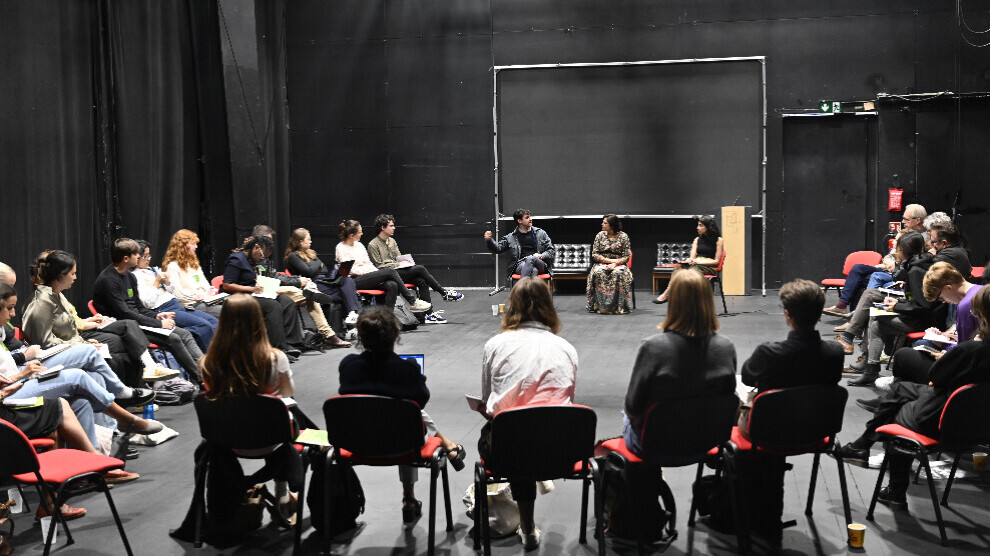"New World Embassy: Kurdistan" event kicks off in Lausanne
The two-day artistic and political project titled "New World Embassy: Kurdistan" opened in Lausanne today.
The two-day artistic and political project titled "New World Embassy: Kurdistan" opened in Lausanne today.

A two-day artistic and political event titled "New World Embassy: Kurdistan" kicked off in Lausanne, where the Treaty of Lausanne was signed in 1923, resulting in Kurdistan being divided into four parts and imposing a century of destruction and denial on the Kurdish people.
New World Embassy: Kurdistan is an artistic project by Nilüfer Koç of the Kurdistan National Congress (KNK) and artist Jonas Staal, hosted by the Vidy Lausanne Theatre. It takes the form of a large scale installation that will operate for two consecutive days as an alternative embassy for the Kurdish peoples, which today find themselves under occupation of four different nation-states: Bakur (North-Kurdistan, Turkey), Rojhilat (East-Kurdistan, Iran), Başȗr (South-Kurdistan, Iraq) and Rojava (West-Kurdistan, Syria).
Ephemeral embassy of a new world
This 'ephemeral embassy of a new world' centred on Kurdistan, is part of the commemorations of the Treaty of Lausanne which also opened the way to the physical, linguistic and cultural genocide of the Kurds.
The event will host participative workshops, films and round table discussions that will bring together politicians, experts and artists around the questions of democracy without state and solidarity cultures.
Workshop on 'Stateless Democracy'
One of the workshops today, titled “Stateless Democracy”, which was participated by Nilüfer Koç, American political economist and general coordinator of the Progressive International, David Adler, and Swiss human rights activist Elisabeth Decrey Warner among others, discussed how Kurdish leader Abdullah Öcalan’s ideas came into being on the basis of Democratic Confederalism in the four parts of Kurdistan.
The workshop addressed the division and sharing of Kurdistan by nation states thanks to the Treaty of Lausanne in 1923, highlighting the fact that the project of Democratic Confederalism sought to eliminate this very mindset of nation state. It was also stressed that the unity of the four parts of Kurdistan is being targeted today.
The workshop also discussed the struggle of women, sine qua non of the Democratic Confederalism project, and evaluated the creation and perseveration of the revolution in Rojava.
Workshop on 'Women’s Struggle for Unity'
Another workshop led by Nazma Akter, a unionist from Bangladesh and founder of the Awaj Foundation, painted a picture of the current situation with the unions and workers in Bangladesh.
The workshop “Women’s Struggle for Unity” addressed the repression of women by the capitalist system and underlined the importance of the Democratic Confederalism project as the way out for women to be freed of this repression.
The series of workshops will continue with “Stateless Decoloniality” with the participation of journalist-writer Necibe Qeredaxi from South Kurdistan, lawyer and political advisor Varshka Gandikota from India and writer Fatima Quassak from France.
The embassy to operate as a “stateless embassy”
The separation of historical Kurdistan can be traced back, in part, to the 1923 Treaty of Lausanne that was signed in Switzerland, which granted a majority of the Kurdish homeland to modern Turkey. Erecting this “stateless embassy” in Lausanne is thus an attempt to confront this historical injustice, but also to represent the alternative ideas of self-determination the Kurdish peoples developed in response to their occupation and separation. Revolutionary Abdullah Öcalan’s vision of a ”stateless democracy” for example, that critiques the patriarchal, nationalist and capitalist mentality of statehood, is today being practiced across different parts of Kurdistan, and can be considered an essential alternative to the crises of the interstate system.
Just as the Kurds have envisioned a “stateless democracy”, so this embassy will operate as a “stateless embassy.” It prioritizes people’s diplomacy – cultural diplomacy – over state diplomacy, and gathers representatives from the different parts of Kurdistan, together with progressive politicians, Indigenous peoples, solidarity movements and cultural workers of all kinds. Together they discuss and imagine with the public what it means to separate the practice of democracy from the state, what a stateless decoloniality looks like in practice, the necessity of cultures of solidarity, and the possibility of a stateless world democracy.
Public gatherings where stateless diplomats meet
The opening days of the event will host “diplomatic circles” that can be attended to in person or through livestream in the afternoons and evenings – both of which will be supported through trilingual Kurdish-French-English simultaneous translation. The diplomatic circles take the form of public gatherings in which stateless diplomats meet to explore to which extent stateless democracy can act as an alternative paradigm to face the present crises of rising authoritarianism, economic precarity and ecological collapse. These are followed by collective dinners with the public, that allow for more intimate exchanges and relationship building. The morning sessions of both days will allow members of the public to join intensive workshops on subjects such as communal self-governance, social ecology and stateless campaigning.
Music, films, exhibition
Around the New World Embassy: Kurdistan, the theatre will be organising a programme of music by Kurdish artists and screening a selection of films. This aspect of 'cultural diplomacy' will provide an opportunity to learn more about the history of the Kurdish struggle and their alternative vision of a democracy without a state.
At the same time, Plateforme 10 will host Jonas Staal's exhibition Stateless States, which imagines a stateless global polity. Through architectural models of alternative embassies and parliaments, maps illustrating the self-determination claims of various stateless movements and videos, Stateless States seeks to liberate us from the traditional notion of the state in favour of a new stateless global culture.